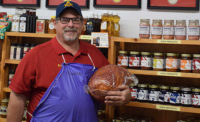For almost 150 years, residents of Northern Kentucky have turned to the Rice family for their meat product needs. Sometimes it was at a market stall in Covington, and sometimes it was at their local grocery store or neighborhood chili parlor. Throughout its history, the company now known as Blue Grass Quality Meats has become synonymous with excellence.
Five generations of Rices have overseen the business, starting with Christopher Rice in 1867. Many things have changed his start at that market stall, naturally; Blue Grass had sales of about $22 million last year and operates out of a 65,000 square-foot facility in Crescent Springs, Ky. However, some things haven’t changed, notes Dan Rice, chief financial officer.
“While there has been some modernization, the old-fashioned quality hasn’t changed,” he says. “There are a lot of things we still do the same way, because it was the right way to do it then and the right way to do it now.”
For instance, he notes, the company still hand stuffs all its hams and turkeys, and it hand trims all beef rounds for its roast beef. While technology has made many of the company’s operations quicker and easier, there are some tasks where machines cannot beat a skilled employee.
Blue Grass boasts a varied product portfolio, which is distributed through retail, foodservice and private label channels. Its most popular items include a comprehensive line of deli meats, wieners, bratwurst, mettwurst and bacon. Many of them are still made with time-honored recipes, points out David Kegley, vice president sales & marketing.
“The flavor profiles are really targeted into this area, and for that reason, some of them are market leaders in their categories,” he says, pointing to a product like the company’s bratwurst & mettwurst.
|
FACT BOX Blue Grass Quality Meats |
| Crescent Springs, Ky. |
| Established: 1867 |
| Products Manufactured: A full line of deli meats and sausage |
|
Distribution: Nationwide with its private label program, regionally with its branded retail and foodservice lines |
|
The year that the Rice family entered into the meat business, there were 37 states, the United States bought Alaska from Emperor Alexander II of Russia for $7.2 million, and Cy Young, Frank Lloyd Wright and Marie Curie were all born. |
A storied history
It was Christopher Rice II, who took over the business in 1905, who gave the company a permanent location in Covington. He turned the company into C. Rice Packing Co., and the company moved into its own building not long after.
As the company continued to grow in the 1930s and ‘40s, it acquired other local competitors, including Weis Packing and Blue Grass Provision Co. Under Bernard Rice, representing the third generation, the company moved into its present facility in Crescent Springs, though it was only 38,000 square feet when it opened.
Along the way, Blue Grass discontinued its slaughter operations and focused on its processed meats. It also became federally inspected and was able to capitalize on its close proximity to Ohio and Indiana. The company’s branded products are now distributed throughout those states, as well as West Virginia, Virginia and Tennessee.
The fourth generation of Bill, Glenn and Jay Rice took over management in the 1980s, and the fifth generation transitioned into management in 2001. Brothers Paul (president) and Steve (purchasing manager) and their cousin Dan lead the company now. All three have been involved in the company for longer than that, however.
“I’ve been getting paid here for 32 years,” says Paul, laughing. “You can read between the lines. My brother Steve is at about 35 years.” Dan, a relative newcomer, has been with the company for 16 years.
Paul notes the importance of having family members in key positions in a family-run business. Dan had a financial background, so his position was a natural fit. Steve’s roles as purchasing manager and shipping and receiving manager are so important that having a family member oversee them is an advantage.
“Steve buys all our raw materials, and meat is a large component to the cost of your product,” Paul points out. “Having a family member there is really where you want to be.”
Dan has two children in college and three younger children, but it’s too early to tell if any of them will want to become the sixth generation of owners. If they do, it will be strictly their decision, as it was for the current owners. In spite of the family tradition, none of the Rices say that they were pressured into entering the family business. Dan, for instance, is the only one of six siblings that is working at Blue Grass. Paul explains that they all chose to enter into the business when they became adults. However, it’s clear that Blue Grass has always been important to him.
“In 1978, we had a blizzard here,” he recalls. “I was working for another company at the time, and my dad called me and said, ‘I need you at the plant.’ Luckily, my boss was very understanding when I said, ‘My dad needs me. I’ll be back.’”
Not too traditional
Blue Grass may place a great importance on its history, but that doesn’t mean that the company is stuck in the past. The company is very modern in key areas, such as food safety. The company is certified SQF Level 2, for example. It also keeps a close eye on changing consumer palates and adapts its formulations as needed.
“We have an initiative where we’re reducing sodium across the board, and that’s been ongoing for the last couple of years,” Kegley explains.
The company also makes use of “attricons,” or icons on packaging that highlight a particular attribute of a product. Many of Blue Grass’ sausages and deli meats have icons for no MSG, gluten-free or low-fat products. The company has a Deliciously Lean variety of bratwurst and mettwurst that is reduced fat, sodium and calories, and it has become popular with consumers.
“Those things are important to the consumer, and we call that out on our packaging,” Kegley says.
When it comes to developing new products, Blue Grass doesn’t try to reinvent the wheel; it is more likely to develop a better, more affordable wheel instead. One of the products it introduced at the 2013 International Dairy Deli Bakery Association Convention in Orlando, Fla., was a dry-rubbed roast beef. It’s made with the best quality beef and spices available without any fillers.
“That’s the approach — not necessarily be new and innovative and cutting edge, but to look at quality as a niche where we can provide a product that’s better,” Kegley says.
Blue Grass is active in the retail and foodservice markets, and it has seen steady growth in its private label business as well. The company’s Blue Grass brand, which goes into both the retail and foodservice markets, accounts for about 50 percent of the company’s business. An economy label, Kentucky’s Best, has done well in the last couple of years and makes up 20 percent. The remaining 30 percent is private label work. Those numbers may fluctuate as the company adds on new customers, but it has made Blue Grass diversified enough to weather the recent economic storms. If the economy sends consumers away from restaurants and into the grocery store to buy their meals, Blue Grass is well-represented in both arenas.
One of the company’s most important foodservice partners is Gold Star Chili, one of the largest chains of chili parlors in the area. Blue Grass supplies coneys, which Dan explains is a local Cincinnati product, to Gold Star and many other independent restaurants.
“It’s one of the things that Cincinnati is known for,” he says. “It’s a small bun with a small, 4-inch wiener topped with Cincinnati-style chili, oftentimes with onions, mustard and cheese. I don’t know how many millions of wieners Gold Star goes through a year, but it’s quite a few.”
Blue Grass Quality Meats is mentioned prominently on the Gold Star menu, not only with its coneys but also with the chain’s double decker sandwiches. A double decker, another chili parlor tradition, is a sandwich piled high with lettuce, tomato, cheese and two types of deli meat served on toasted bread. Blue Grass helped Gold Star develop and add the item to the restaurant’s menu, and it supplies the turkey, ham and roast beef.
Paul believes that much of the company’s future growth will come from private label sales, where the company’s size gives it some advantages.
“One thing that helps us is that the minimum requirements from some of the big processors are just too large for some of the customers out there,” he says. “With our situation, it’s not too small. We can make a smaller batch than the big boys can.”
Kegley adds that Blue Grass, which has just the one location, can be more efficient for a private label customer who may be looking for multiple products across multiple species, including ham and pork items, turkey breast, roast beef, corned beef and deli sausages.
“Companies that are seeking private label buy an item from one company, but if it’s a marginal item, then they have trouble getting the distribution at a reasonable freight cost,” he says. “If we can ship everything from one point, there’s a value there.”
Kegley says that one of the cornerstones for the company throughout its history has been customer service.
“Everyone here has a can-do, get-it-done attitude when it comes to getting things done for the customer,” he says.
Blue Grass has expanded its current facility multiple times to accommodate its growth. The most recent expansion in 2002-2003 added 15,000 square feet to the building. Despite the company’s large product portfolio and its belief in hand work, Blue Grass produces all its meat products with a relatively small staff. The company has a total of 88 employees, 57 of which are production workers.
Blue Grass has made some strategic decisions to increase its versatility. It began producing turkey breasts in-house about three years ago, utilizing much of the same equipment used for the ham production. Much of the credit, though, goes to its employees. Many employees have more than 15 years experience, and one worker is celebrating his 50th anniversary with Blue Grass this year. He was hired by Bernard Rice, grandfather of the current owners.
Dan says that there is usually not a shortage of candidates when jobs open up, and the production team’s experience is an advantage in bringing in new hires.
“It’s good to have the long-timers here to train the new people who are coming aboard,” he comments.
The amount of hand work that the Blue Grass employees do is not likely to change. That choice is not due to an aversion to modern technology.
“We have some very nice, specialized equipment,” Paul notes, “but at the same time, we do a lot the same way that we did 60 years ago. You could make it faster with equipment, but the quality’s not going to be there.”
After 146 years of family ownership, Blue Grass Quality Meats is not likely to trade the “Quality” in its name for “Convenience” anytime soon.













Report Abusive Comment